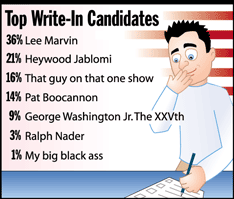

 |
 | |||||
|
Decision 2000 20:04:13 PST Tue 07 Nov 2000 -- The polls have closed by now, except in Alaska and Hawaii (do we let them vote?). I can therefore rant without fear that I might influence your vote. The only influence I would like to exert is to exhort you to vote, period. Voting is the only act of pure consequence-free self-expression open to everyone (except children and other felons).
When a citizen of a large republic marks a ballot, she is saying, to herself, "This is my political identity," or, more prosaically, "This is who I am." While a large number of votes may make a difference in the aggregate, no single vote will make an appreciable difference in the outcome of an election. For empirical purposes, the act of voting takes place entirely within the mind of the voter. Once completed, it is impossible to observe the content of one's vote (while I routinely photocopy my completed Accu-Vote ballot, this in no way establishes that the ballot was in fact posted, or that I did not vote differently in person). The only information recorded is that the voter has voted at all, and increased voter turnout is the only statistical goal that I publicly champion. To the degree that it originates in the mind, every action expresses oneself. What one eats, how one works, what one buys, where and with whom one lives all say something about oneself. Voting is distinct from these other acts in that it has no direct consequence for the voter. Voters are therefore afforded the creative freedom of artists; indeed, voters are freer than artists in that they are unburdened by the need for the approval of critics or patrons, and they have an audience of but one. This is particularly true where, as is common, voters are permitted to write in candidates of their own choosing. At least once a year, voters are handed a blank canvas and invited to contribute their self-portrait. So considered, it is little wonder that most citizens shrink from such a daunting invitation. 
Predictably, advertising is a great boon to many voters in their electoral expression. Political advertisements explain what one's electoral choices say about oneself. In the winner-take-all republic, political parties have no greater purpose than to endure as particularly successful examples of brand self-identification. Polls are also useful in informing voters about themselves because, for many Americans, identities such as "progressive" or "isolationist" are less important than the identity of "winner." When complemented by an abstention from public advocacy, this admittedly solipsistic view of voting accurately models the rewards and penalties of participatory democracy. Take the ballyhooed dilemma facing voters, such as myself, who carry a latent meme for liberalism: as galling as a Bush presidential victory would be, how does one ignore the many flaws in Gore's platform and record? For myself, I could not contort my self-identity to include a vote for Gore (rather than contribute to the non-voting demographic, I fell back on a reliable write-in). By not publicly advocating that others vote as I do, I was in the position (curious to some, perhaps; vile to others, certainly) of not voting for Gore while hoping that enough others will. If Washington's electoral votes go to Bush by a margin of a single vote, I will deserve to look as foolish as I am sure I will feel. That I have been able to arrive at such a vantage is entirely due to the lack of any direct empirical consequence of my vote. We are regularly granted the opportunity to add a chapter to the narrative of our political journey that we tell ourselves, without any risk or limits. I do not contest that many are content with the identity of "non-voter," but I suggest that what I suspect some have claimed as their reason for not voting, futility, is not alienating but in fact emancipating. Copyright © 2000 by Eric Scharf. All rights reserved.
|
|||||||||||||||||||||||||||||||||||||||||||||||||||||||||||||||||||||||||||||